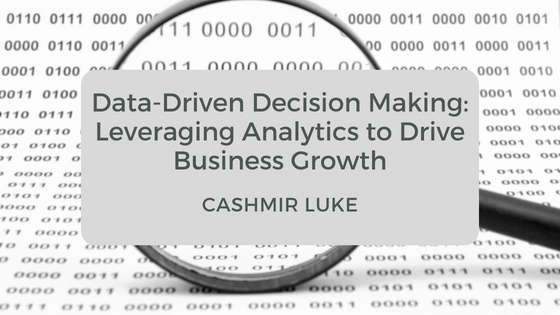In today’s fast-paced and highly competitive business landscape, making informed decisions is crucial for sustainable growth and success. Data-driven decision-making (DDDM) has emerged as a game-changer, empowering businesses to harness the power of data and analytics to optimize operations, enhance customer experiences, and drive overall business growth. This blog explores the significance of data-driven decision-making and how leveraging analytics can fuel business success.
Understanding Data-Driven Decision Making
Data-driven decision-making involves the process of utilizing data, statistics, and analytical insights to guide strategic choices and actions. Traditional decision-making methods often relied on intuition, experience, or gut feelings, which might have led to hit-or-miss outcomes. However, DDDM prioritizes evidence-based decision-making, enabling organizations to make informed choices backed by concrete data and analysis.
The Role of Analytics
The foundation of data-driven decision-making is analytics. Analytics involves the examination of vast amounts of data to identify patterns, trends, and correlations that may not be apparent through mere observation. By employing various analytical techniques like descriptive, predictive, and prescriptive analytics, businesses gain valuable insights into customer behavior, market trends, operational inefficiencies, and potential growth opportunities.
Driving Business Growth through Data-Driven Decision Making
- Enhanced Customer Understanding: Data-driven decision-making allows businesses to gain a deeper understanding of their customers’ preferences and pain points. By analyzing customer data, companies can tailor their products and services to better meet customer needs, leading to increased satisfaction and loyalty.
- Efficient Resource Allocation: Allocating resources effectively is essential for business growth. Data-driven insights enable businesses to identify areas of inefficiency and reallocate resources to optimize productivity and profitability.
- Personalized Marketing and Customer Engagement: With the help of data analytics, businesses can create highly personalized marketing campaigns that target specific customer segments. This not only improves customer engagement but also increases the likelihood of conversions.
- Predictive Maintenance and Improved Operations: For industries relying on machinery and equipment, predictive maintenance driven by data analytics can help anticipate maintenance needs, reducing downtime and enhancing overall operational efficiency.
- Competitive Advantage: Data-driven decision-making allows businesses to stay ahead of the competition by making faster and more accurate decisions. This competitive advantage can be a significant driver of business growth and market dominance.
- Identifying New Market Opportunities: Data analysis can uncover emerging trends and potential market gaps, enabling businesses to proactively explore and seize new growth opportunities before competitors.
Overcoming Challenges
Implementing data-driven decision-making is not without challenges. Businesses need to invest in the right data infrastructure, talent, and tools to handle and analyze large datasets. Additionally, ensuring data privacy and security is of utmost importance to maintain customer trust and comply with regulations.
Data-driven decision-making has transformed the way businesses operate and grow. By leveraging the power of analytics, companies can gain actionable insights into their operations, customers, and markets, enabling them to make informed choices that drive business growth. Embracing data-driven decision-making as a core business strategy will not only boost competitiveness but also foster innovation and long-term success in today’s data-centric world. To thrive in the digital age, businesses must recognize data as their most valuable asset and harness its potential to pave the way for a prosperous future.

